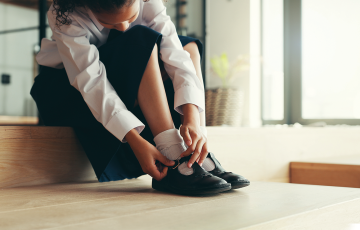5 smart ways to steer clear of social jet lag

Staying up later and sleeping in the next morning on the weekend? Here’s how to not fall into the trap.
Social jet lag occurs when you change your sleep schedule on weekends or days off by staying up later and sleeping in the next morning. Here’s how to not fall into the trap.
For most of us, weekends are for relaxing, unwinding and recharging our batteries for the week ahead. They are also about having fun and catching up with our nearest and dearest, which can mean late nights – and late mornings. Going to bed and waking up later on weekends can lead to side effects that are similar to changing time zones, without having gone anywhere (other than that party that was just a short Uber ride away).
1
Break in routine
Going to bed and waking up later on weekends is something that we are all guilty of, even if it’s done sporadically. While it might seem like a harmless vice, it can actually be quite harmful to your health.
“Social jet lag promotes practically everything that’s bad in our bodies,” says Till Roenneberg, professor of chronobiology at Ludwig-Maximilian University in Munich (and the guy who coined the term). “Your cognitive performance is greatly reduced.
Memory capacity and social competence is reduced. Your entire performance is going to suffer. The way you make decisions is changed. Simply put, if we are sleep-deprived, we behave quite differently than when we sleep enough.”
What this means is that your weekend bedtimes can lead to difficulty falling asleep on Sunday night and pretty much guarantee an exhausting Monday, which will make the (already depressing) first day of the week even worse.
What about the physical downsides of social jet lag? “The more social jet lag you have, the more likely it is that you’re a smoker, the more alcohol you drink, the higher your caffeine consumption – and you are slightly more depressed than the rest of the population,” says Prof Roenneberg.
It has also been linked to obesity, diabetes, heart disease and mental-health issues. Fortunately, social jet lag is preventable if you adhere to a fairly rigid but not impossible daily schedule. Here’s how to do it.
![]()
“Social jet lag PROMOTES practically EVERYTHING THAT’S BAD in our bodies”
2
Get enough sleep
This might seem obvious, but in order to keep your circadian rhythm in check, you need to make sure that you are getting enough good-quality sleep. This means going to bed at more or less the same time each night, adhering to a consistent bedtime routine and making sure you get a minimum of seven hours of shut-eye (preferably eight). It’s also important to make sure that your gadgets (phone, tablet, laptop) are off and not emitting any light or sounds, which can be disruptive and hinder your ability to fall asleep.
3
Eat the right foods
A healthy diet is a cornerstone of good health, and what you eat – and what you don’t eat– can be a contributing factor when it comes to social jet lag. One tip that experts in the fields of biology and nutrition agree on is that certain foods and drinks can promote or hinder a good night’s sleep. Their advice? Eat a smaller supper as early as possible and avoid caffeine from the afternoon onward.
4
Get some sunlight
Modern working hours are not always conducive to keeping our inner clocks ticking as they should. Something that you can do is to make sure that you’re getting good exposure to natural light in the early mornings – and less bright, artificial light in the evenings.
When you get sufficient sunlight in the mornings on a daily basis, your inner clock will reset itself, and you’ll start to want to get up at that time every day. Keeping your environment darker in the evenings will, in turn, help your body to wind down. Time for a new routine!
5
Rise and shine
South Africans are some of the earliest risers in the world. Which may seem like a good thing but according to sleep-tracking app Sleep Cycle, only 27% of us are getting the recommended eight hours of sleep a night.
6
Limit your after-hours screen time
Most people spend a large portion (if not all) of their working day staring at a screen. However, the light that is emitted from our gadgets is not only damaging to our eyes and skin but is also disrupting our natural circadian rhythm – and makes falling asleep that much harder. Few of us can refrain from using our phones, tablets and laptops in the evenings, either, so adjusting the screen light settings to dim rather than glaring is a step in the right direction.
Prof Roenneberg says that society’s entire attitude towards sleep needs to undergo a major change, and that it should be taken a lot more seriously. If you want to prevent social jet lag and lead your best, most alert and energetic life, start prioritising shut- eye tonight, this weekend, and forever.
Related articles

Latest Jet club magazine
We’ve got the latest trends, exciting prizes and exclusive savings just for you!
Jet Club will not pass your details to anyone else. By clicking the subscribe button you confirm you have read and agree to the Jet Club Terms and conditions and Jet Club Privacy Statement.
Subscribe

